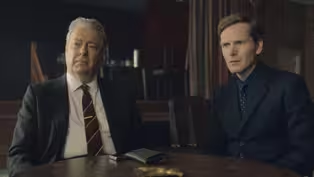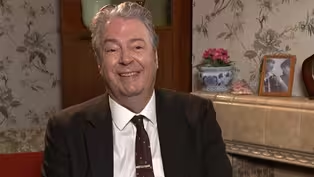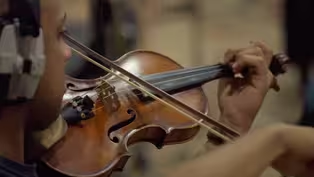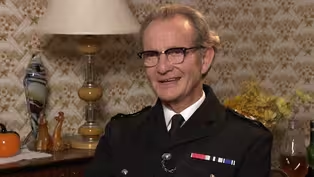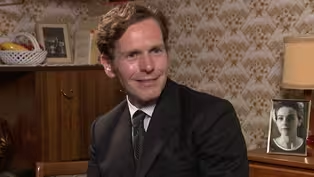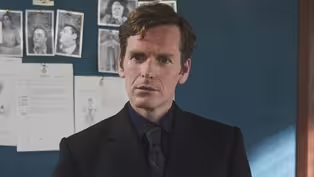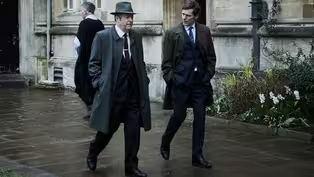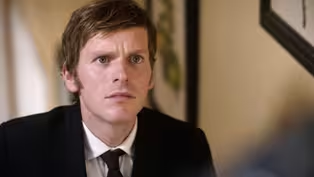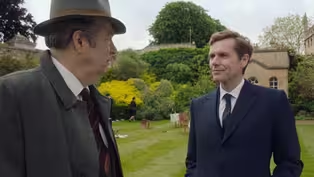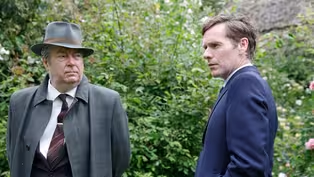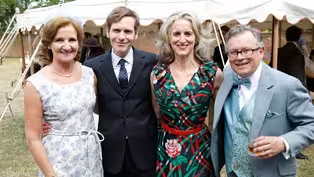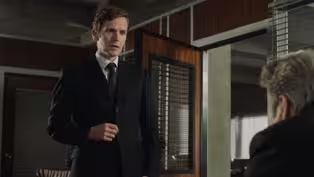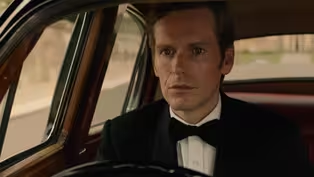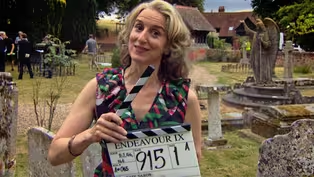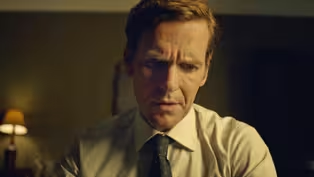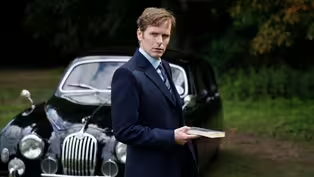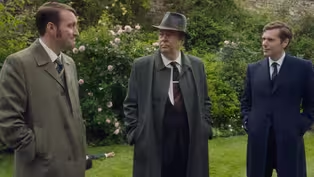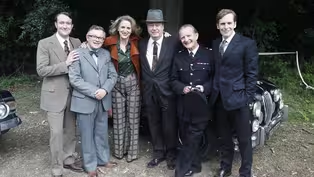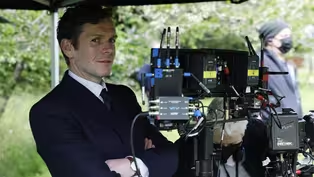
Q&A with Shaun Evans
Clip: Season 9 | 32m 42sVideo has Closed Captions
Watch a recording of a live Q&A event with Shaun Evans, hosted by Jace Lacob.
Watch a recording of a live, special Q&A event with Shaun Evans, hosted by MASTERPIECE Studio podcast host Jace Lacob, to hear all about the final season, acting, directing, and more!
Problems playing video? | Closed Captioning Feedback
Problems playing video? | Closed Captioning Feedback
Funding for MASTERPIECE is provided by Viking and Raymond James with additional support from public television viewers and contributors to The MASTERPIECE Trust, created to help ensure the series’ future.

Q&A with Shaun Evans
Clip: Season 9 | 32m 42sVideo has Closed Captions
Watch a recording of a live, special Q&A event with Shaun Evans, hosted by MASTERPIECE Studio podcast host Jace Lacob, to hear all about the final season, acting, directing, and more!
Problems playing video? | Closed Captioning Feedback
How to Watch Endeavour
Endeavour is available to stream on pbs.org and the free PBS App, available on iPhone, Apple TV, Android TV, Android smartphones, Amazon Fire TV, Amazon Fire Tablet, Roku, Samsung Smart TV, and Vizio.
Buy Now
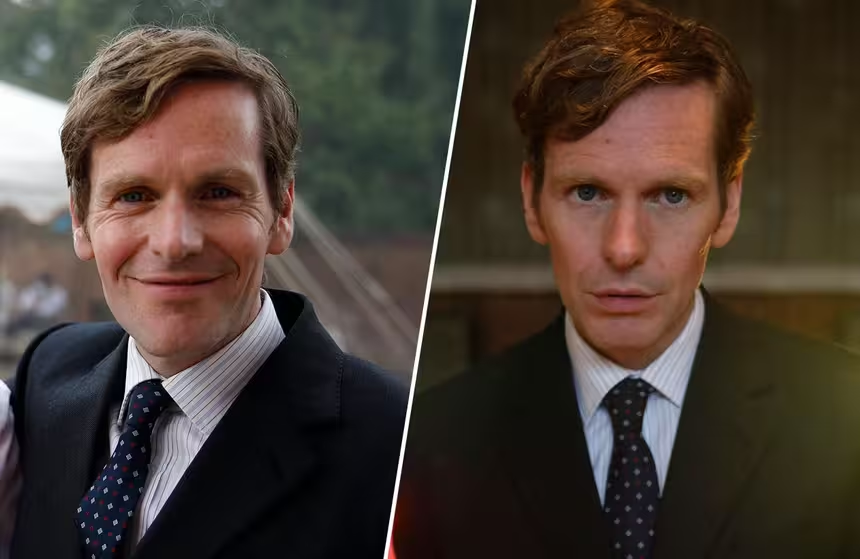
Shaun Evans on Endeavour’s Finale
After a decade of playing iconic British detective Endeavour Morse, Shaun Evans brought Endeavour to a powerful conclusion with its gripping series finale. Evans shared his genuine reflections on saying goodbye, that last ride in the Jag, a certain message in a bottle, and more. Read on, and mind how you go.Providing Support for PBS.org
Learn Moreabout PBS online sponsorship- I'm Jace Lacob, the host of MASTERPIECE Studio, and we are live with "Endeavour" star, director, and producer, Shaun Evans.
- Hey, everyone, how's it going?
Thanks for having me.
- We are live.
I feel like I should ask you to hold up a copy of today's newspaper, maybe the "Oxford Mail," or something.
(Shaun laughs) just to show that we are live here.
Because "Endeavour" was conceived as a "Morse" prequel series, there was always gonna be an expiration date, at some point, unless you played the role for another 20 years or so.
Why did it feel like the right time to end the series?
- Why did it feel like the right time to end the series?
Well, I think... we didn't really have many intentions to go beyond the 33 that they made with "Morse," so we always knew that the end was on the horizon.
I think, all of us, the team, myself, and Russell, Roger, and Damien, and the guys at ITV, as well, felt that the conclusion that we'd reached wasn't the best that it could be.
So, we decided to do three more than the original, but it just felt like the right time.
Sometimes you just know, right?
And also you wanna leave the party... You wanna leave the party at the right time.
You don't wanna be the last person there, right?
You don't wanna leave when it's good and not when you've over stayed your welcome.
(laughs) - The curse of the ninth symphony is invoked here.
I believe it was Schoenberg who said, "It seems the ninth is a limit."
Is this a playful reminder that we're approaching the end of "Endeavour," that we're in the ninth symphony and are standing close to the hereafter?
- Yes, it is indeed, well caught.
That's what's beautiful about Russell's writing, Russell Lewis's writing, I think.
It's also detailed and there's little Easter eggs there to be found if you look carefully enough.
And embedded within this there's many little farewells and farewell motifs.
So, yes, indeed, it is.
- And as we just saw, Morse returns to Oxford in this episode, seemingly full of optimism after being treated for his alcoholism after series eight.
Does his optimism last here and can it ever last in the darkness of Morse's world?
- Oh, I think it doesn't last intact, but I think there's a small degree of optimism and hope, I think, which takes us right through to the end of the final episode.
And then, I hope, as well, that he has a degree of optimism about life beyond the stories that we tell.
But... this is, I would say, the pinnacle of his optimism at the beginning of Prelude.
- After receiving his cure in Lime Regis, he's abstaining from alcohol.
(Shaun laughs) He even turns down drinks with Dorothea Frazil, which she notes rather curiously.
Does the cure then hold?
Are the pink elephants of withdrawal banished at least.
- Oh no, alas, the cure does not hold.
As soon as things begin to get emotionally tough, he finds his solace in a pint of real ale.
So, no, alas not.
But that's the character that we know and love, right?
- Morse.
You mentioned the 33 films that John Thaw had done and the 36 that you've done.
And by the time the curtain falls, that's three more episodes, ultimately, than John Thaw did.
I mean, what do you take away from the experience of having played Endeavour Morse for more than a decade at this point?
- What do I take away from it?
Oh, my goodness, so much, I mean, so much.
Well, a decade's worth of experience and laughter and friendship... And the people, the people, you know.
The friendships that I've made with the people.
And the work, as well.
Work's funny, isn't it?
It's kind of like that's what's beautiful about long form TV, I think.
You get the chance to really explore something and then it becomes like a message in a bottle.
You just launch it and it has its own life beyond what you'd hoped and imagined and you get on with your life.
And so there's so much that I take away from that period of time.
And all with gratitude as well, I have to say.
It's been one of the most extraordinary experiences of my life, really.
- Okay, well, I'm gonna ask you, then, to smash open that message in a bottle, crack the bottle, take out that note, and look at it.
I mean, in that sense, how did playing Morse help shape you as an actor, as a director, as a producer, and as a man?
- Oh wow, good question.
(laughs) That's a good question, that's a big question.
How did that help shape me?
Well, do you know, in many, many, many ways.
I think, leading a company, I suppose, of actors for that amount of time has definitely been a huge learning curve.
And to also be learning from actors like Roger, Anton, Abigail, Caroline, you know, and all of the extraordinary guest actors that we've had in, as well.
So, that's been one element of, I suppose, from the acting point of view.
And then from directing, I think to be exposed in every scene, to terrific directors, some of the best directors, I think, who are working in TV, at the moment.
And to see firsthand how they're conducting their day-to-day business on set, how they're getting the best out of people, and how they're doing their work, is sort of like a film school, you know.
So, to be up close and personal with my little notebook, taking notes, and making notes, it's, kind of, been an extraordinary apprenticeship from a directing point of view.
And then, as a man, I guess, it's just helped me to grow in confidence.
And also, you know, I just feel incredibly grateful that work's really important to me and that I've been blessed with the opportunity to be doing it at such an intense degree for such a consistent amount of time.
You know, practice, practice, practice always makes you better, right?
And so, it's shaped me in so many ways, so many ways.
So, it's been an extraordinary experience.
I feel very blessed, actually.
- You mentioned some of the best directors working in television, and that would include Mr. Shaun Evans himself, as well.
- (laughs) I wasn't leading up to that.
- No, no, no, I... - I wasn't leading up to that.
- I mean, you directed a few episodes- - But yeah, you are right, I'm just joking.
- I can say it, I can say it, you can accept it.
You directed a few episodes of "Casualty" before you helmed Apollo in series six of "Endeavour."
And then you went on to direct the opening episodes for series seven, series eight, and series nine.
How did "Endeavour" inspire you to direct and, to borrow your your phrasing, how did the production provide the perfect, sort of, film school for a new director?
- Okay, good question.
Well, I think, how did it inspire me to direct?
I think that had always been something that I've been interested in, you know, as a storyteller, you know.
I don't wanna be grand about it, but I think, as an actor, I see myself more as a storyteller.
And I was always interested in every part of it, every facet of it, really.
And also, I never wanted to limit myself to be only being able to tell the stories that depend upon me and my very particular, how I sort of present to the world.
I always wanted to get beneath it and beyond that, and to be able to explore stories that I would never be cast in, you know, to act.
And plus, also, I think, the stories are incredibly important.
The stories that we tell ourselves about ourselves, the stories that we tell one another, you know, I think stories are incredibly important, aren't they?
And so, what was beautiful about the "Endeavour" experience was that it just provided a framework in order for me to be able to... to direct consistently, you know, and to be able to do that for, to make a, sort of, 90-minute film, once a year.
Technically, it provided, sort of, it was like a film school, in that regard.
And, like I said earlier, about, sort of, being able to watch the directors that are working and steal the bits that are useful whilst applying them to my own particular way of working.
So, yeah, does that answer your question?
I don't know if it does.
- It does, it does.
I mean, last time I saw you, you had a camera with you and you were, sort of, taking photos of everything.
And then I've loved to see, sort of, how you've developed as a director.
- Oh, thanks, man.
- Particularly with the episode everyone just saw, Prelude.
We're gonna talk about it in a minute, but I thought it was a beautiful episode.
- Oh, thank you.
- We asked fans for questions, as well.
Kat M, from Nevada, asked, "What will you miss most about playing Morse and what aspect of Morse did you most, or least, connect with?"
- (laughs) What will I miss most about playing Morse?
You know, what the people, the people, but then with the caveat that we're all still incredibly close.
I went to see, you know, Roger's in a play, at the moment, and Abigail and I speak frequently.
James Bradshaw, who plays Max DeBryn, was in a play recently, which we all went, as a team, to go and see.
So, I will miss the people, but the people are still very much in my life.
I think that's been one of the beauties of the experience as well, is to have been able to create a family of sorts.
But, I suppose, I'll miss the detail and the intellectual rigor of Russell Lewis's writing.
Yeah, and also Damien Timmer, as well, who's an exec producer at Mammoth.
I'll miss their intellectual rigor, I think, you know, when we're talking about story and their experience as makers of brilliant, topnotch TV.
So, that's that.
In terms of the second part of the question is... how am I most like Morse, is that what it was?
- Or what aspects of Morse did you most, or least, connect with?
- I suppose least is easier.
I think, like, the things that are similar, all sorts of, obviously, I don't really wanna, I try not to think too closely about them, but where we're different, I think, is where the interest, where the, sort of, the characterization, I suppose, for want of better word, lies.
And, I suppose, I'm very optimistic and so, I don't really relate to his nihilism or cynicism.
And also, I'm a very outgoing person.
I, kind of, chat to everyone, and so, I wouldn't be someone who's in the corner, quietly watching, do you know, I'd be more boldly introducing myself to everyone.
So, we're not alike in that regard.
(laughs) - It is 1972, 7 years have passed, in the world of the show, was there any sort of trepidation about how these final three films would function to tie up the story and line up with "Morse," or was it a matter of just trusting in Russell Lewis to dot those i's and cross those t's, as it were?
- Yeah, I mean, not trepidation per se, I mean, I think we all wanted, everyone on the team wanted, to make it as satisfying an ending as possible.
And also to give the audience something, you know, a reward for staying with us for so long.
Then to finish on a real hi that's, sort of, well, emotionally impactful, I suppose, rather than a hi.
And, you know, it's not like it's taken us by surprise, the ending.
We all knew that it was coming and I've been having conversations since the beginning, really, about how it would end and what the end would look like.
And, you know, that's been an ongoing conversation virtually all the time that we've been making the show.
So, it's, sort of, it was less of a surprise and more of a... trusting in Russell.
But also, you know, just, I have to say that when I read the first draft of the final episode, I did think, wow, yeah, he's done a great job there.
I found it quite emotional reading the final episode.
- So, I have to ask, I'm gonna put you on the spot.
- Yeah.
- Given that there were those conversations pretty early on about how the show would end, without spoiling anything, is the ending, ultimately, different than what you had originally discussed?
- No, I don't think it is, I don't think it is.
I think there's certain nuances which is slightly different.
'Cause, of course, we're a team making it, you know.
It's not one person's voice.
And so... it's by committee, I guess.
But no, it's still very much in the ballpark of what we discussed, satisfyingly so, I think, satisfyingly so, you know.
- Very satisfying, yeah.
- It's an interesting project.
It's been interesting because it's so, of course, it's very dear to me, but I think but likewise for Roger, for Abigail, for Russell, for Damian, for ITV, you know, for all the people who have made it.
It's something that's, I think, very special and dear to us, 'cause we've been making it such a long period of time and always encouraged one another to make it the best that it can be, you know.
So, we all wanted our own particular stamp on how it ended, but I do think we have, harmoniously, achieved that.
- Mm, knowing, then, that the end was coming, that these would be the final three "Endeavour" films, did going into production on series nine feel different, that each scene, in a way, would be leading you closer and closer to that final shot?
- Yeah, for sure, for sure.
But, you know, it felt like a celebration, really, to be honest.
You know, that beautiful thing (coughs) of (coughs) we saying when it would end rather than it no longer being popular or it being canceled or whatever, you know.
We were, sort of, the masters of our own destiny there in terms of the story.
And so, it felt like a celebration that we'd gone that far.
And also knowledge that, you know, this is the last time we might be doing this particular scene with this particular person.
That in itself is a celebratory thing.
But also, I think as well, because we created it, I think we all felt emboldened to really push it and to make it the best that it can be for ourselves as well as for anyone else, you know, so that we've all got something that we're incredibly proud of.
So yes, it did feel... it did feel precious, but in a really, not in a sad way, in a really good and, yeah, emboldening way, I suppose.
- On a personal level, yeah.
I mean, I would imagine so.
Jodi K, from Florida, asks, "How did you approach playing the role of a younger version of an established character?
Did you have a plan for how your character would evolve towards his older self?"
- Well, I didn't have a plan.
When it first began, I hadn't seen any of John Thaw's TV version of it, so I just read the books.
But I'd read one or two of the books and then when the job came my way, I read all of them, and then I was intrigued about, I was intrigued and I had a lot of questions about how we could... take someone in his mid 20s to the person that we know in his, you know, early 50s, or whatever.
I was intrigued and I had many questions about it, but no answers.
And so...
I think, slowly, slowly it began to emerge, for me at least.
But I didn't come in with a great master plan of how we would do it, or how I would do it.
I just thought, you know, try and make each scene as truthful and as interesting for me, and for the character, as possible, you know.
- We come now to talk about Prelude, which you directed, beautifully.
- Thank you.
- It's full of murder and music and menace.
You're working with a full orchestra here.
Each of these "Endeavour" films offers its own unique challenges.
But what challenges did Prelude offer in terms of directing?
- What challenge did Prelude offer in terms of directing?
Good question.
Well... the orchestra, actually, now that you've mentioned it, (coughs) because music is such an integral part of the show and part of this character's life and inner life, the music is huge.
We wanted to get that right and make it the absolute best that it can be.
And so, Matt composed some music for it.
And then we got an orchestra and the actors who were part of the orchestra, we wanted to see people who also had a degree of proficiency with the violin or with the instruments that they were playing.
And so, I thought, oh, that's gonna be a challenge.
I wonder if we can get actors who were really brilliant.
And also, you know, grade eight violin.
And, fortunately, we did.
Suzy Paris, who has been, you know, Suzy Paris was the casting director of "Endeavour" since the beginning, is, kind of, an unsung hero on this.
I believe she's done magnificent work pulling together, extraordinary, some of the best actors working in the UK at the moment, you know.
And consistently she's done that in every single episode.
And she did it again with this.
And so, we, fortunately, managed to populate the orchestra with extraordinary actors who were also extraordinary musicians.
So, what was a challenge also became a really interesting process, you know.
Yeah.
- A challenge to an opportunity, basically.
- Yeah, exactly.
That's what I was looking for, Jace.
That's much better.
(both laughing) - The first shot of Morse this season is an interesting one.
We see a crossword puzzle, then we see Morse doing it, sitting alone in Christchurch Meadow against the backdrop of Oxford.
He seems very separate, isolated.
What were you looking to say about Morse, as a character, with this shot at the start of series nine?
- Well, two things, actually.
Exactly that, that he is isolated and separate, but also he is completely in his world.
Like, there's no to-ing and fro-ing anymore.
There's no, maybe I'll retire, maybe I'll go and do this.
There's no, on a bus on his way somewhere.
I wanted him to be completely in his universe, and that seems the most fitting place to do it.
- I mean, that sense of isolation, I think, is echoed elsewhere in the episode.
There's that shot of Morse striding through the arcade before he questions the orchestra members.
And we get that series of arches that, sort of, dwarf the solitary Morse.
As a director, do you think in terms of motif?
- Oh, do I think in terms of motif?
I think in terms of pictures, I guess, and also I think in terms of juxtapositions.
So, I think one image is only powerful when placed against another image or... as in the case of the one that you've just spoken about, those magnificent arches, I thought it was, sort of, a subconscious feeling, really.
But, as soon as I saw it, I thought, yeah, that's right.
Someone who's got a huge intellectual life above him, which is, kind of, glorious above his head because of his great intellect, there's something about that which, kind of, makes sense to me, but also, you know, trying to isolate him in the frame as much as possible, to try and keep him on his own, keep him separate from the other actors.
It's twofold, really.
It's a way, I think, of saying, this is the person who's taking us through the story.
And so, the audience completely identify, you know, with this character.
But it is also a way of saying, in this particular case, he is at his most alone, now.
He is at his most isolated, or certainly will be by the end of it.
And that is, again, going back to what I was saying about doing the crossword in Christchurch Meadow, he's not only in his physical place, but I wanted him to feel completely in his emotional place as well.
That sounds very highfalutin, doesn't it?
But, yeah.
(laughs) - No, mission accomplished.
- That was the intention, no?
- Endeavour and Thursday have had such a complex dynamic over the course of these nine series, one that has been tested time and time again.
They, kind of, found something that was, maybe, akin to a father, son bond, a mentor, student bond.
I mean, what does Morse think of Thursday?
And does that bond extend beyond their working relationship at this point?
- Oh, for sure, yeah, for sure.
I mean, I think it's all so rich and complex.
Like I said, I've being able to tell a story for such a long period of time and the detail, the granular detail of Russell's writing, but also of Colin Dexter's as well.
Like in the books, Morse has a very fractious relationship with his own father who left his mother, whose mother then died of cancer.
And then Morse was, or Endeavour, was pulled from that environment to go and live with his dad and stepmum with disastrous effect, with disastrous results.
And then went to go to Oxford, meandered around for a few years, and then landed as a detective in Oxford with this ready-made father figure, who not only shows him how to be a better policeman, to some degree, but also, I think, provides the first real role model of how to be a man, how to be a good man, how to be a family man.
At least, that is what Endeavour is putting on him, I think.
That's what Endeavour's putting on him, because, I think, by the end he's completely disappointed in what... spoiler.
(laughs) - There is an awkwardness, in the clip that we saw, between these two men.
I mean, Morse invites Thursday to grab lunch and he declines saying he's just come from the pub with Strange.
Morse is really thrown by that, almost emotionally so.
What does he make of the distance that has formed between him and Thursday here?
- What does Endeavour make of the distance?
In that moment, I think he's... yeah, I mean, I think, slightly disappointed because, I guess, he's come back and because if you think the last time we saw them, Thursday says to him, at the end of season eight, "Go and sort yourself out."
And I think Endeavour comes back and wants to show him and to extend the hand of friendship and say, I put that behind me, now let's go and have lunch and I won't have a pint.
It's that opportunity.
And also, I think, perhaps, maybe his spidey senses are tingling, that he's, like, that's strange, though.
Thursday's being so aloof.
- Hmm, hmm.
- Hmm.
- Sandy- - Why don't you wanna have lunch with me?
- Oh, Sandy M, from Pennsylvania, asks, "Do you have a favorite filming location?
If so, why?
- Oh, that's a good one.
Do I have a favorite?
I have a couple, actually.
So... well, Oxford itself, I absolutely love.
I actually love the place.
The architecture is just magnificent and the atmosphere is magnificent.
I also loved filming in Venice, similar, everywhere you look, it's, kind of, beautiful.
But I suppose one of the colleges, which was my favorite, was St. Catz.
I love architecture, so it's designed, I think, by Mies van der Rohe and it's everything about it.
It's just so well thought out and well put together, down to the cutlery, the carpets, the chairs.
And it was just a delight to be filming in a place which is... well, it wouldn't be everyone's cup of tea, but to be in a place that is so well considered in every single detail, it was one of my favorite.
I can't remember the title of what film that was, what episode that was, but yeah, that was one of my favorites.
- Christopher Wren is, kind of, getting uppity in his grave, now.
- (laughs) Yeah, I'm sure, yeah.
Listen, he gets- - Set against van der Rohe - He gets enough accolades.
(laughs) - There's a visible tension between Morse and orchestra guest soloist, Christina Poole, in Prelude.
Might there be a romance in Morse's near future?
Is this another, in a long line of near misses, in Morse's love life?
- I think... potentially, potentially.
I dunno, I often think... sorry, digressing somewhat.
In life, we're continually presented with the same problem until we prove that we've learned the lesson, right?
Do you know what I mean?
Like, we keep calling the same lesson to ourselves, in many ways, until we're, like, oh actually I'm gonna do that a different way, now.
Do you know what I mean?
And I feel like it's the same with fiction, as well.
And I feel like it's the same in this way.
He keeps, in some way, calling the wrong person to him who's connected, in some way, to the crime, in a sort of way.
And it's just not gonna work out.
So, the sooner he learns that lesson, the better, I think.
That doesn't answer your question, at all, Jace.
I just (indistinct) (both laughing) - But very philosophical.
- Thanks very much.
- And I agree.
- Thanks very much.
- Jenny S, from Maryland, asks, "Which episode or scene was the most challenging for you emotionally, and how did you see it through?"
- (sucks) Which episode or scene was the most challenging emotionally?
I think she's probably asking, if I can remember, but I think she's probably asking, like, given that it was the end, did it feel emotionally charged in that way?
And, in a funny way, I think we all wanted the work to be as strong as possible.
So I don't think, 'cause I'm a big believer in keeping the drama on the screen, you know, not to feel however sad or elated or whatever I may feel about the work that we're doing that day.
I think it's important to do the work, you know, that's the most important thing.
And so... yeah, it didn't really feel emotionally charged, if that makes any sense.
- It does make sense.
I mean, unrelated, Endeavour harks back to a, seemingly, simpler time, one that's devoid of social media and mobiles.
Why do you believe the show struck such a chord with its devoted fans?
- Good question.
I think, part of what you said is true, a part of the simplicity, the harking back to simpler times.
I think that's an element, certainly, in it, but I think it's something... it's just, if I may say so, good stories, well told, I think, you know, clearly defined characters that are on an interesting emotional journey.
Yeah, I dunno, it's difficult to pick that apart.
I think it's a combination of things.
I think it's a combination of things.
What do you think?
- I mean, I think that's, definitely, part of it.
I think it's the, sort of, smartness of the writing.
I think it's Mr. Shaun Evans as Endeavour Morse.
- Jace, I'm a fan.
- Fantastic, he's good.
The performance of the entire cast, I think, it's a great ensemble.
I think it's Oxford.
I think it's a weird, ephemeral thing that has made it just as beloved as it is.
- Yes.
- It's so many different things.
- I also think the atmosphere of melancholy is really important.
The atmosphere, I mean, the things that I like, either to read or photographs or films or TV, the atmosphere of melancholy I find really moving and intoxicating and, I think, we've tried to inject as much of that into this as poss.
So, maybe that's an element of it too.
- It is a very happy show.
- It's a happy show?
Yeah, I mean- - It is not happy.
I mean, it is, but- - It's happy in the making.
- The melancholy, I think, is- - It's happy on the making, but I think that- - It's, yeah, it's a very melancholic, I think that's precisely the right word for the show.
I'm not gonna put the Thames Valley Police on you, I swear, but I am curious, did you take anything from the set with you, a prop or a memento, to commemorate your time as Morse?
- Just the Jag, just the Jag.
- Just the Jag?
- I'm joking, I'm joking.
(both laughing) Can you imagine?
Yeah, it's parked outside.
No, what did I take?
I didn't, well, actually, no, I did.
I took... costumes, really, costumes are really important for me, when I'm working, I think, getting the right costume can really help, in so many ways.
And I remember when we first started the job, Jesus, a decade ago now, I was looking for the perfect suit, trawling round secondhand stores and couldn't find them.
Was there for hours and hours and hours and hours.
And then went to this final vintage store and, again, was going through all the rails, looking at the suits, and nothing was quite right.
I dunno, specifically, what I was looking for, but nothing was quite right.
And then, at the end, a suit fell off the end of the rail and I thought, oh that's interesting, and I like got it and tried it on and was like, "Oh yeah, this is it, this is the one."
It wasn't this one, but it was, but I thought that's the perfect suit.
So then, every season I tried to get, well, and then I wore it till it was thread bare and they got one made exactly the same.
And so I have that, I have that.
- That is the perfect- - I mean, what's someone else gonna do there, right?
I mean, what's anyone else gonna do with it?
It's only gonna get destroyed.
And plus I like it hanging in my wardrobe.
Dunno what I'm gonna do with it, but... - Remember it.
- I should've worn it for this interview.
- You should, yeah, you should put that on.
- Can you imagine?
(laughs) Let it go Shaun, it's finished.
- It's done, it's done.
This is, rather sadly, the final series of "Endeavour."
The bodies are piling up, the goodbyes are coming fast.
How would you describe series nine in a single word?
- I think it's magnificent.
I do, I think it's magnificent, honestly, I really do.
I think it's, like...
I think it's really good.
I think it's really good.
- Shaun Evans, thank you so very much.
(Shaun laughs) The magnificent final season of "Endeavor" begins Sunday, June 18th, 2023 at 9:00 PM Eastern on MASTERPIECE on PBS.
Thank you so much.
- Thank you, thank you, Jace.
Thank you very much, thanks everyone.
Writing Endeavour's Nine Seasons
Video has Closed Captions
Clip: S9 | 2m 55s | Anton Lesser and series producer Charlotte Webber admire the writing of the series. (2m 55s)
Video has Closed Captions
Clip: S9 | 2m 57s | Roger Allam looks back on playing DCI Fred Thursday for the last decade. (2m 57s)
Video has Closed Captions
Clip: S9 | 4m 49s | Composer Matthew Slater explains the process of creating the music for the series. (4m 49s)
Video has Closed Captions
Clip: S9 | 32m 42s | Watch a recording of a live Q&A event with Shaun Evans, hosted by Jace Lacob. (32m 42s)
Video has Closed Captions
Clip: S9 | 2m 49s | Anton Lesser looks back on his years playing Chief Superintendent Reginald Bright. (2m 49s)
Video has Closed Captions
Clip: S9 | 2m 53s | Shaun Evans looks back on his many years playing the one and only Endeavour Morse. (2m 53s)
Video has Closed Captions
Preview: S9 | 30s | Nothing lasts forever...tune in for the final season, beginning Sunday, June 18 at 9/8c. (30s)
Video has Closed Captions
Clip: S9 | 43s | Take a look back on some of the major moments from Season 8 before tuning in for Season 9. (43s)
Video has Closed Captions
Clip: S9 | 1m 8s | Endeavour Morse: Cerebral, dedicated...and sassy! Look back on 8 seasons of sassy quips. (1m 8s)
Video has Closed Captions
Clip: S9 | 2m 10s | Morse and Thursday: Longtime partners, forever friends. Relive their biggest moments. (2m 10s)
What's Ahead in the Final Season
Video has Closed Captions
Clip: S9 | 2m | Get a refresher on where we left off in Season 8 plus what's ahead in Season 9! (2m)
Video has Closed Captions
Clip: S9 Ep3 | 2m 56s | Cheers to Joan and Jim! Hear from the cast about filming the major event all together. (2m 56s)
Video has Closed Captions
Clip: S9 Ep3 | 1m 36s | Peter Jakes makes a surprise visit to the station, while DCI Thursday gets some news. (1m 36s)
Video has Closed Captions
Preview: S9 Ep3 | 30s | A series of cryptic death notices provides clues to Endeavour’s final investigation. (30s)
The Cast and Creators on The Ending
Video has Closed Captions
Clip: S9 Ep3 | 4m 58s | "Our revels now are ended." The cast and creators reflect on the ending of the series. (4m 58s)
Abigail Thaw on Endeavour's Ending and Legacy
Video has Closed Captions
Clip: S9 Ep3 | 1m 47s | Abigail Thaw discussed her father's legacy and the emotional ending of the series. (1m 47s)
Video has Closed Captions
Clip: S9 Ep2 | 1m 14s | Morse is haunted with memories of the past as he delves into the file of a closed case. (1m 14s)
Video has Closed Captions
Preview: S9 Ep2 | 30s | A crime wave has taken hold of Oxford. The death of a uniformed policeman shocks everyone. (30s)
Video has Closed Captions
Clip: S9 Ep1 | 1m 3s | Thursday checks in with Morse who, after taking some time away, is back on the job. (1m 3s)
Video has Closed Captions
Preview: S9 Ep4 | 30s | Go behind the scenes to explore the end of the epic tale of the iconic Oxford detective. (30s)
Video has Closed Captions
Clip: S9 Ep4 | 2m 3s | The cast and creators of the Morse universe look back on 35 years of Endeavour Morse. (2m 3s)
Providing Support for PBS.org
Learn Moreabout PBS online sponsorshipSupport for PBS provided by:
Funding for MASTERPIECE is provided by Viking and Raymond James with additional support from public television viewers and contributors to The MASTERPIECE Trust, created to help ensure the series’ future.



